THE DOG BLOG
For
Animal Lovers
and
Lovers of Travel
~~~Belize~~~
A monthly blog to be read from Top to Bottom
February 15, 2006
I leave my little spot near Tulum that's been my home for two weeks. It's time to go. It just feels that way. More, many more people have turned up, others are leaving. Halfway to Belize, I stop down a dirt road to rest, but instead, finish The Kite Runner, a book I hope any of my books can come close to in quality. I recommend it highly.
I spend the rest of my peso's on gas and a few food supplies but forget I have little water. The dogs can drink melted ice from the icebox. I'll manage. By now it's too late to make the border crossing. I turn down a dirt lane and discover a huge empty construction area ringed by tall trees. It doesn't look like it's been in use for some time. We take a walk. It's lush in a way Tulum never could be. There's a variety of trees and because of that, a variety in bird life. I sleep well.
February 17, 2006
I drink the remainder of my water. And for breakfast, I drink a bottle of non-alcoholic ginger beer I've been saving instead of my typical ginger tea. I realize soon I'll be able to speak English, Belize's main language. I'm excited.
Less than an hour later, standing in customs, I'm not so excited.
"You don't have an importation certificate for your dogs?" the agricultural inspector asks.
"I didn't know I needed one," I reply, thinking of how I'd breezed through Mexican customs three times at three different border crossings.
"Is this a problem??"
"Hmm, yes. Big problem."
I'm suddenly extremely grateful this is one of the few countries in the world where English is the main language. Two hours later after going to a bank in the free zone, to get $100 in cash from a bank, than a few forms, a man is ready to inspect the dogs. They'd been unavoidably sitting in sweltering heat inside the heat and are ecstatic to be let out. The man eyes them learily.
"Can you hold their ears so I can check for fleas and ticks?"
"Do you want me to open their mouths so you can see their teeth," I ask.
No, he does not.
A family of Mennonites are behind me and they instantly remind me of Arab families, but in different costumes. The women-folk have head-coverings, the little boys cowboy hats and the men are the ones in charge of the paperwork. Coincidentally, I'd chosen today to wear an outfit which constitutes a regular part of my wardrobe when in the Middle East - a long part of flowery pants which resemble a skirt. Traditional, conservative and unrevealing.
I only wish paperwork for the van is as easy. In fact, none of it is difficult, it never is. But the mold customs people are made from is the same all over the world. And as a woman, doomed is the day there's a woman custom's official standing in front of me. Today is that day. Though for the Canadian couple pulling a trailer, it is no easier. She drills all of us about what we've read on the form and assures us in no uncertain terms that if we break any of these rules, there will be serious consequences the next time we enter Belize with a vehicle. She and her co-worker pose a question, with an incredulous tone, I haven't heard since travelling through the Libyan desert by camel.
"Why didn't you fly here?"
I am sure she is the most unpleasant person alive, bearing a permanent chip on her shoulder until she begins talking to friends on her cell phone-of which she has many. When she goes outside to inspect the van, she orders me to put leads on BOTH dogs. I already have one on Bruiser just for show since I know neither will go anywhere.
"They don't bite," I say. I want to add, But I do. Instead, I keep silent.
February 20, 2006
In the morning fog we walk as a lone palm tree greets the sun through the mist. It is not only sugarcane that grows here, but banana's, mango's and corn. But scattered throughout, are sections of old forest where birds of many varieties call loudly, making what would normally be a sterile environment, lush. I make a huge circle with our walk and on the return come across a small orange and grapefruit orchard. In the middle sits another well. Chives grow in container nearby. I pick-up four grapefruit which have fallen that insects haven't yet attacked and carry them back to the van. It's a slow walk, as a thin layer of mud squishes between my soles and shoes. On the bottom of them is a thick layer of caked mud.
When I left the US, I was sure my near future travels would mean the multi-culturalism which is so much apart of America, would end, and lands of only a few cultures begin. I was wrong. Belize is like no where I've been before. There are people whose ancestry is Indian (in Asia), Chinese, Mennonites, Africans, Lebonese, Spanish, Mayans and of course British. Then an abundance of American and Canadian expatriates. Everyone seems to speak English. Which feels odd and somewhat unsettling. Instead of being tongue-tied because I don't speak the language, I'm tongue-tied becauase I can't get used to the idea I can speak English.
February 20, 2006
I've discovered perhaps why things go so fast in America - because of the size. Belize is only 175 miles long and I drive an hour, then stop for the day. In Mexico, which was far larger than I realized, five hours driving at a stretch was nothing. Ditto the US.
I discover one more time that unless I write everyday my life doesn't work. Sunday I wrote sooooo much it was great. But then was too excited to sleep. So I decide I'd leave camp early the next morning without writing. The rest of the day is a chain of events like a bad game of domino's. While driving, a tiny bird flies in front of the car. Most of the time, you see them fly out the other side. This time, I hear or feel, I'm not sure which, a imperceptible thud. At the gas station, the man warily watches me pump gas in the tank. Usually there's someone to do it.
"How much are you wanting to put in?"
"Twenty Belize dollars."
"You're already past that."
He then informs me gas is $10 a gallon. ($5 US) Suddenly, a little detour I was going to take is an investment. I hadn't in fact calculated what the rest of my journey to the Nicaragua/Costa Rican border was going to cost. Now I have. It's really irrelevent, because we have to do what we have to do. So it's really unnecessary fear and keeps us away from our bliss.
But, the news sets me off course. And I probably spend $10 getting lost around Belize City looking for a ATM machine so I can buy more gas. Then at the gas station, I bang my head twice getting out of the van to put air in the tires. Ridiculous.
Belize City is disorienting. My mind struggles to put it in a box, and the closest it comes is Nairobi by the water. It has that same edge of unease, but mixed with building which look like they barely managed to survive Hurricane Katrina in New Orleans. This also is hurricane country, and many buildings are up on stilts just like in Lousiana. People talk Creole, Spanish and English. I'd hoped to restock on some English basics and devour English sausages, since a much young Queen Elizabeth II is on all the currency, but no luck. But, it's nice to hear some English accents again.
After having been camping solo for about five days, I decide to stay at a public campsite in San Ignacio. The grassy lawn is packed with RV's from Canada and the states, but there's no one around. It's a huge birding party and they've taken off for a few days. There are however two different couples from Canada and we drink cashew nut wine I'd bought for sundowners. It is delicious!
February 22, 2006
We head into town and I decide Dog, Bruiser and I can walk in the streets which are quiet with few cars today. We meander this way and that along a street which caters largely to tourists. Colourful two story wooden buildings like those in the South loom down on both sides. Suddenly, coming towards us is a pack of six dogs. Five male and one female. Bruiser, usually quite game to take on anyone, whimpers and hides behind me. He's tough and is alive because he spent the first five years of his life on the streets of Kenya. But he's smart and knows he's limits. Dog, being female is not intimidated, though certainly overwhelmed. But both are fixed, and so the street dogs, some with collars, loose interest.
We walk down another street, and suddenly the streets dogs are there too, but in greater numbers. A huge fight breaks out amongst them, and one gets trapped next to a fence, but gets free. Now out in the open, one of the males attacks another and for a few moments they all join in before leaving the main two to fight. Meanwhile, another fight starts half a block away. It is a ugly scene and though part of Bruiser now wants to join in, I make sure he hangs back.
"Break it up!" a man yells, running up to the two nearest me. "You're right here, why didn't you stop them?" he yells at me.
"Hey, it's their battle. It's not my business. They have to figure it out amongst themselves."
"But he was killing him."
"No, he wasn't killing him. It just looked ugly. What I want to know is why there are only male dogs on the streets. Are they picking up the females and killing them?"
They put poison down sometimes, but they can't tell if the females or males will eat the poison and die," he says as if I'm an idiot.
"No, of course not. I think they're picking up the females because they're the ones reproducing and killing them off the street."
It's a policy I've seen in other places. And I fear it's getting closer to the time more poison will be put down. Fights break out everyday as the packs wander through the tourist areas and all through the small town. The dogs are not aggressive to humans, but they're numbers are daunting and the energy they put out is pure testosterone.
In the evening, I'm still in town, talking with an American who lives in Punta Gorda, where he's helping build a resort on the Moho river. I've decided to leave the next morning and so after cashing in change, and buying a few more supplies I get in the van and leave. Once again, the pack of dogs are there and now Bruiser and Dog are in the car, they feel it's their right to bark their heads off at the dogs below them. The pack, feel totally within their right to retaliate, which they do by chasing the van. Attempting to loose them, I go the wrong way up a one-way street. But it's night-time, it's Belize and though a few people standing on the street corner shout, no one really cares.
February 26, 2006
It's time to leave San Ignacio. I've debated going through Belize and crossing into Guatamala, or leaving here more quickly by the close Guatamalan border. I decide I'd like to see the Southern part of Belize. Less than 20 miles outside of San Ignacio I see a turning to Spanish Lookout. It's only six more miles. "Damn, I think. Another distraction." I take it.
Someone had sent me a copy of a NY Times article which had come out a few days before about oil being discovered in Spanish Lookout. People are guardedly optomistic having heard this news before. However, a tanker full of this 'sweet' and pure crude, which you can use in simple engines without processing is en route to the US. I wonder about taking photos and sending them to a stock agency in New York.
Spanish Lookout is Mennonite country and amongst all the wooden farm buildings is a new tire store with black glass and looking more like a bank. I swing around to the back and ask a young blond teenage boy if he knows where this is.
"Yes, they're drilling on my father's land, just up the road."
"Do you think anyone will mind if I took pictures?"
"No, I don't think anyone will care."
One of the joys of being overseas is that so many of the restrictions we have in the West don't apply. If I went to an oil facility in the US, I'd be told I had to contact the head office, probably fill out insurance forms in triplicate and shoot from a mile away. (I'm just guessing...) Here in Belize, I spoke to Bob from New Zealand who's been working here a year and then Vergil from Tennessee, and I was on. I donned a hardhat and got to shoot a man from Trinidad overseeing new Belizean workers putting pipe into the ground from just a few feet away. Whatever your feelings about oil, it's an exciting process.
That evening I meet up with one of the contracted workers from Wyoming, and a man who lived in South Africa for 11 years at a restaurant in town owned by a man born in the former colony of Rhodesia. It was partly because of him they're drilling here.
"I'd been here a year when my ex-sister in law came out from California. I'm on a river and she didn't like all the bacteria in the water when she took a shower. Well, I ended up because of her having a bore-hole dug. But along with reaching water, they struck oil."
He called his friend Jean a geologist from France who'd been working with the government for many years. Jean had suspected for years there was oil to be tapped, but all the big companies who'd come through found nothing. After some investigating, he chose the spot in Spanish Lookout. The first place they drilled, came up trumps.
February 27, 2005
Instead of camping at Inglewood, I head further outside of town and camp for free on open land. There's only 250,000 people in all of Belize. I'm not sure how many that works out per square mile, but I do know it's easy to camp here. Few fences, few restrictions.
February 28, 2005
I'm really starting to see why people who win the lottery have a difficult time adjusting. Not having ANY, or few restrictions means I spend a lot of time deliberating what the next move should be. I doubt this will get much sympathy from most people! So once again, I'm debating, Should I stick around for start of canoe race or head out for the four-five day drive to where I really and truly want to be-the Nicaraguan/Costa Rican border?
And this I've discovered, is why I write. It's soothing/calming/meditative. The outside world disappears. I can be totally frazzled when I wake up, because travelling can be exhausting, but if I write, I'm forced to focus. I write, catch up with emails and do photos for the next few days.
March 3, 2005
The annual canoe race, perhaps Belize's biggest extravaganza, and certainly dwarfing the elections two days ago begins at 7am. It's a four day event and begins in San Ignacio and ends in Belize City. I parked nearby and the dogs and I walked over the wooden bridge (which had been built as a temporary structure but still remains) through the throngs of people. Everyone who lives in San Ignacio must've been there plus the tourists passing through. At one point, Dog and I got separated which made us both panic till we saw each other again. I rushed them to a good vantage point near the metal suspension bridge where the canoes began promptly at 7am, thanks to the time keeping of the British Army, who'd I'd met there night before. They've entered 11 boats. The stakes are high and Michael from Snooty Fox said his crew won the first year, but he's not entering now. It's become since 1998 an extremely competitive event, I've heard the second largest canoe race in the world. Teams from all over now have boats costing a small fortune.
March 4, 2005
I head to the border and stop at an incredible stretch of river to swim and wash my hair. A man and a boy in a canoe are picking up garbage. Part of a new program. He mentions a lot of the garbage goes from Guatamala. Belize is so into conservation. Amazing.
The border crossing is easy and I drive for a few hours until I reach a restaurant. When I ask for take-away, the teenage girls, like teenage girls everywhere giggle in incomprehension. A Mexican man who lives in America jumps up to translate and then invites me to the table he shares with two Guatamalan men. After some moments of hesitation, I join them.
We have wonderful conversations.The Guatamalan man is disappointed that though an American friend of his once joined him in Baja California for a fishing trip, he won't go any further south. "American's are so scared to travel, not like the Germans, and the Canadians, they are everywhere! And we met a woman in her 60's from Holland, who left home over 30 years ago and never went back. She sails all over the Caribbean and up the rivers. We had the sense she has a lot of money." Later I thought perhaps she takes foreigners on tours on her boat to get by... They mention the dangers here, but don't lecture, and the disappointment they feel realizing their government is placing a priority on preserving the forests and wildlife like neighboring Belize.
The men are right. Guatamala by contrast appears to be heavily forested. I'm in one of those sections now, camping in a logging area. (Yes, sounds odd, but it's out of the way, I can be by myself with no one around...I'm familiar with these areas from the US.) I hear howler monkeys. And I'm all alone with them. Given a choice, I prefer being in the presence of wildlife and not seeing them, but knowing they are there, to seeing them in a sanctuary crowded with other humans—wonderful and necessary though sanctuaries are...
March 5, 2005
At midday, a branch breaks in the little island of a forest nearby and Bruiser stands at the alert, bristeling. Monkey's begin howling and because he's not connected howler monkey sounds with appearance, he begins barking. I watch them through my binoculars and Bruiser calms down. This is the first time we've seen monkey's since we left Kenya three years ago. In the evening there's a rainbow. Then, to see if I can stand it any better, two toucans perch nearby on a tree and a parrot flies by. Life is good.
|
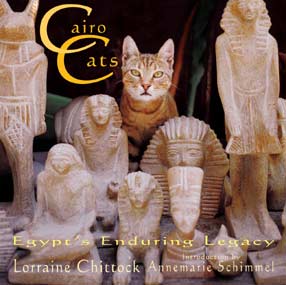


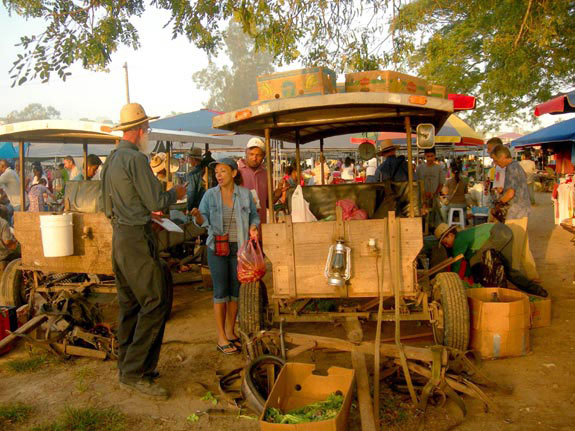
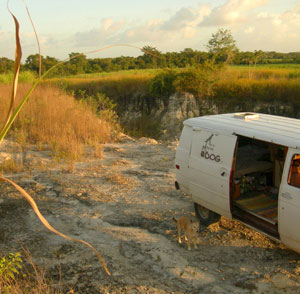



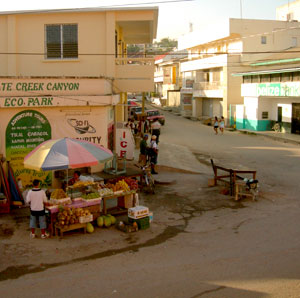
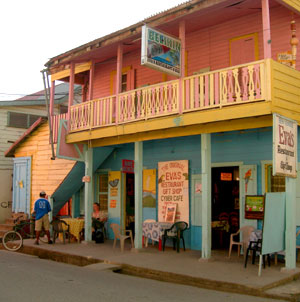

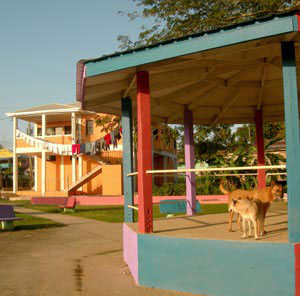
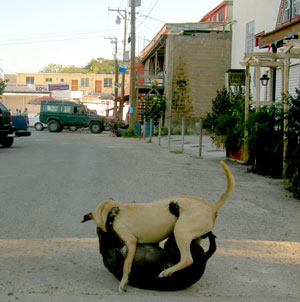
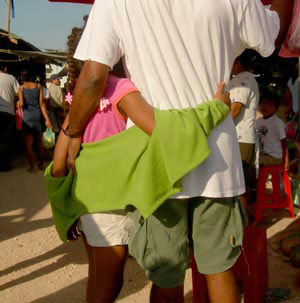
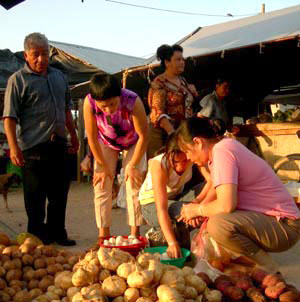
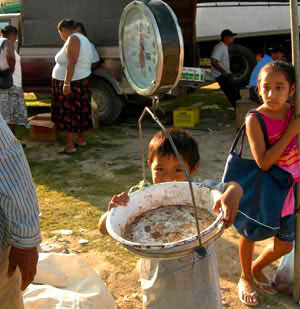
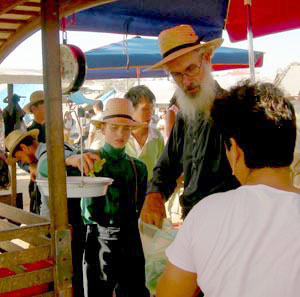
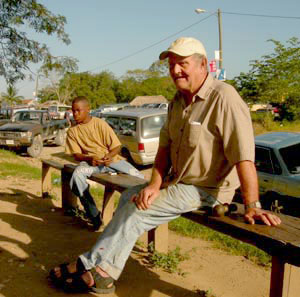

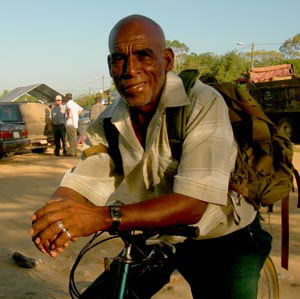
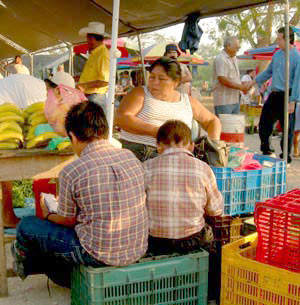

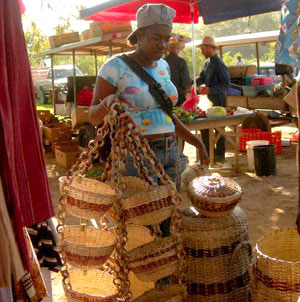






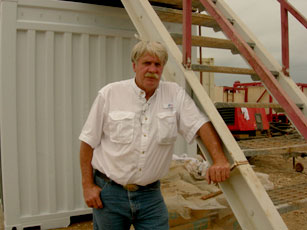

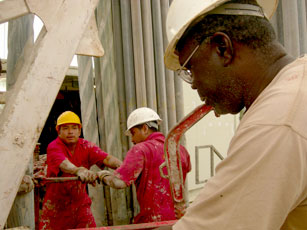
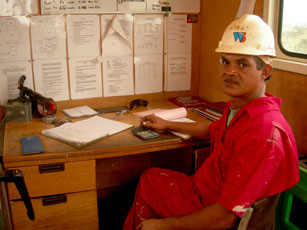
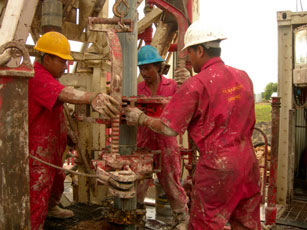
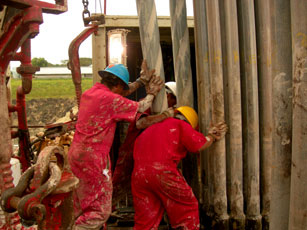
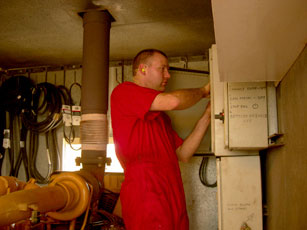
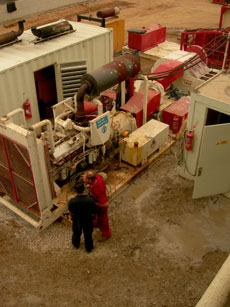
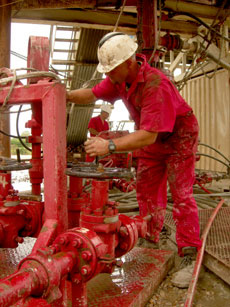
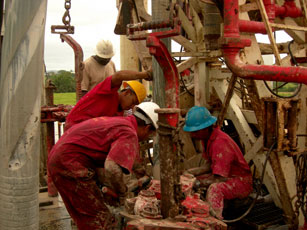
 UNLEASHED DOG TRAVEL ARCHIVES
UNLEASHED DOG TRAVEL ARCHIVES